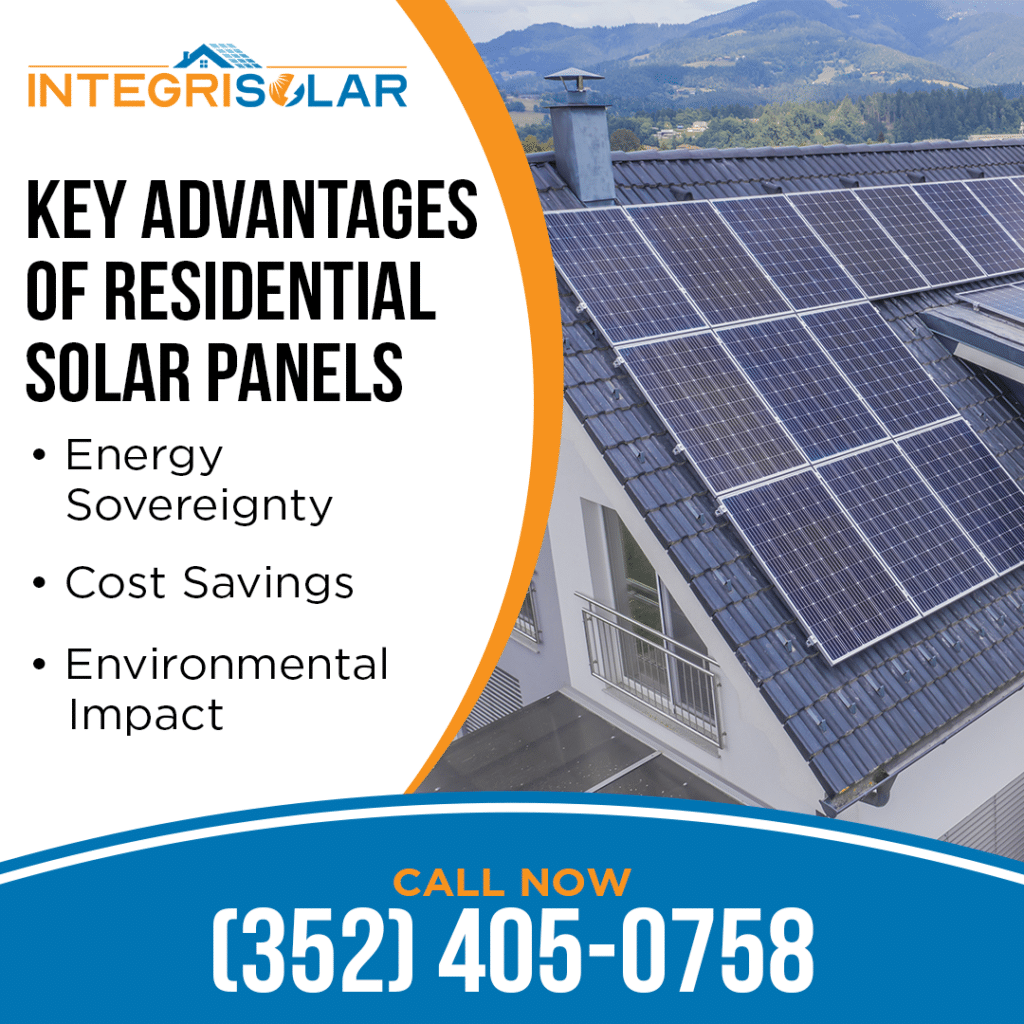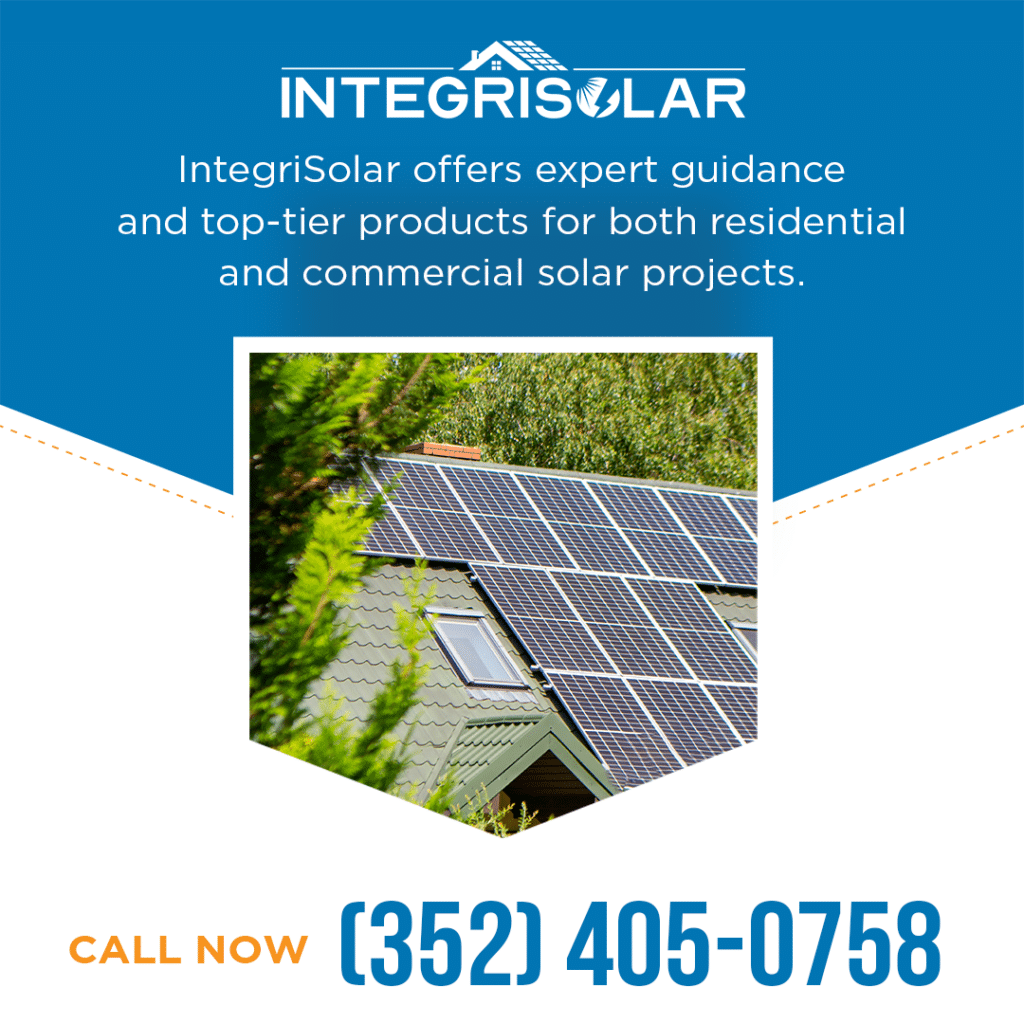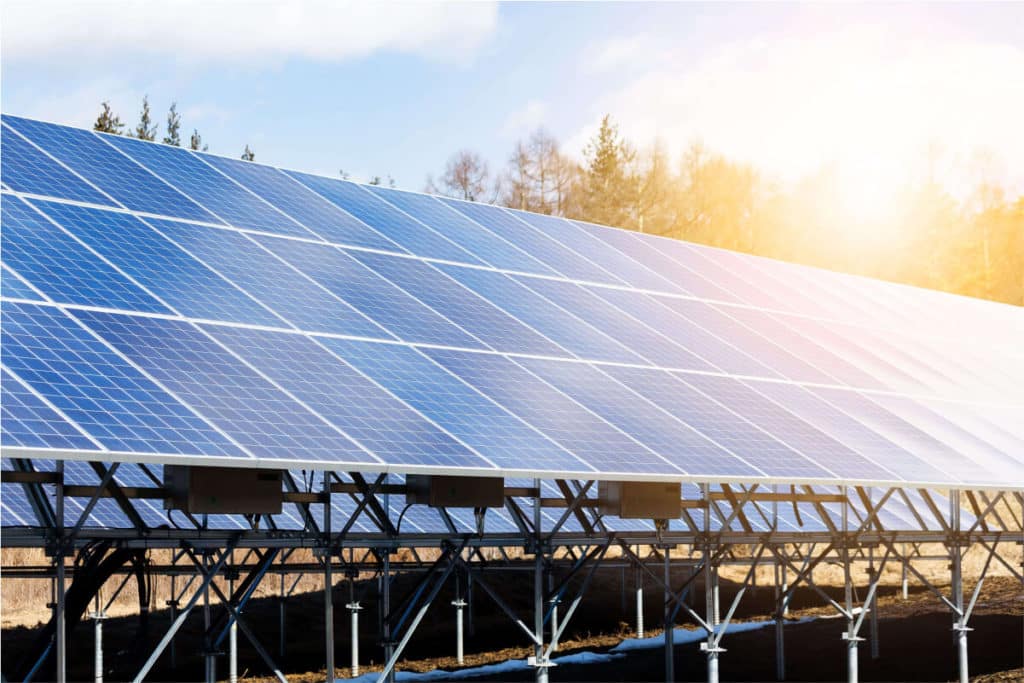We’ve all heard about solar energy, but do you know the contrast between solar farms and residential solar panels? This article by our expert team at IntegriSolar, the leading solar energy company, discusses the distinctions, covering size, energy production, environmental impact, and costs. Whether you’re considering going green at home or interested in large-scale renewable energy projects, understanding these differences can help you make informed decisions about harnessing the sun’s power.
Key Takeaways
- Solar farms generate electricity on a massive scale in high-sun exposure areas, producing energy in megawatts. In contrast, residential solar panels are designed for individual households and generate electricity in kilowatts.
- Solar farms concentrate energy production in centralized locations, repurposing unused spaces and reducing greenhouse gas emissions, although construction and maintenance can disrupt local habitats.
- Solar farms require a significant upfront investment due to their large scale and benefit from economies of scale. In contrast, residential solar panels are more affordable for homeowners, offering savings on electricity bills.
- IntegriSolar, a trusted solar energy company, makes achieving energy independence simple for homeowners. With seamless installation and top-tier products, IntegriSolar’s solar panels on residential and commercial properties offer reliable, green energy. Property owners benefit from lower utility bills, reduced carbon emissions, and greater control over energy usage. IntegriSolar’s expertise ensures hassle-free installation and long-term savings, empowering homeowners and commercial property owners to embrace sustainable living effortlessly.
Size and Scale
When considering the size and scale of solar farms compared to residential solar panels, we must acknowledge the significant difference in energy output potential. Solar farms, often owned and operated by large solar energy companies, cover vast expanses of land with thousands of solar panels. These solar energy companies focus on maximizing energy production to supply power to a broader area. On the other hand, residential solar panels, typically installed by local solar providers like IntegriSolar in Ocala, FL, are designed to meet the energy needs of individual households.
Solar farms can generate electricity on a massive scale, contributing significantly to the overall energy grid. The sheer size of these solar installations allows them to produce electricity more efficiently than residential solar panels. In contrast, while residential solar panels installed by your trusted solar energy company, such as IntegriSolar, may not produce as much energy individually, they are crucial in decentralizing power generation and promoting sustainability.

Energy Production
Regarding energy production, solar farms, and residential solar panels differ significantly in output potential. Solar farms, expansive installations comprising numerous solar panels, boast a considerably higher energy production capacity than residential solar panels. Strategically positioned in areas with ample sun exposure, solar farms are meticulously designed to generate electricity on a large scale. The vast size of solar farms allows them to produce energy in megawatts, making substantial contributions to the overall energy grid. At IntegriSolar, a trusted solar energy company in Ocala, FL, we recognize the importance of residential and large-scale solar solutions in meeting diverse energy needs. While our residential solar panels cater to individual homeowners seeking sustainable energy sources, solar farms provided by large-scale solar providers play a pivotal role in augmenting the renewable energy supply at a broader scale, fostering a greener and more sustainable future for all.
Residential solar panels, typically installed on rooftops or small plots of land, have a more limited energy production capacity. While they can still generate electricity for individual households, their output is usually in kilowatts rather than megawatts. However, they can still produce surplus energy to sell back to the grid.
The difference in energy production between solar farms and residential solar panels also impacts their respective contributions to renewable energy goals. Solar farms are crucial in large-scale renewable energy production, helping regions reduce their reliance on fossil fuels. In contrast, while residential solar panels promote energy independence at the household level, their impact on broader energy production is more localized.
Ownership
Solar panels and solar farm ownership represent distinct approaches to harnessing solar energy, each with advantages and considerations. Solar panel ownership typically involves individuals or entities installing photovoltaic (PV) modules on rooftops or ground-mounted arrays to generate electricity for on-site consumption. In contrast, solar farm ownership entails developing large-scale installations comprising numerous solar panels across expansive land areas to generate electricity on a utility-scale level.
One key difference lies in the scale and capacity of energy generation. Individual solar panel owners typically generate electricity to meet the needs of their homes, businesses, or facilities, promoting energy independence and providing greater control over energy production and consumption. In contrast, solar farm owners produce electricity on a larger scale, supplying power to utilities or communities and contributing to the overall energy grid.
Ownership of solar panels offers individuals autonomy and control over their energy production, enabling them to reduce reliance on grid-supplied electricity and achieve greater energy independence. Additionally, solar panel owners may benefit from various incentives such as tax credits, rebates, or performance-based incentives, further enhancing the financial appeal of solar energy investments.
On the other hand, solar farm ownership requires substantial capital investment and may involve complex financing arrangements, partnerships, or power purchase agreements (PPAs) with off-takers. While solar farm owners contribute to renewable energy production on a larger scale and may generate revenue through electricity sales or renewable energy credits (RECs), they also face challenges such as land acquisition, permitting, and operational management.
Opting for solar panels through IntegriSolar, your local solar energy company in Ocala, FL, promotes energy independence by empowering individuals to generate electricity. Solar panel installation ownership gives homeowners autonomy and control over their energy production, reducing reliance on grid-supplied electricity and achieving greater self-sufficiency. On the other hand, solar farms play a crucial role in supplying renewable energy on a larger scale to communities or utilities. Whether individuals choose individual solar panel ownership or communities invest in solar farm development, stakeholders contribute to advancing renewable energy adoption and fostering a more sustainable future.
Environmental Benefits of Solar Farms
Solar energy has emerged as a promising solution to mitigate climate change and transition towards a sustainable future. Solar farms, large-scale installations comprising numerous solar panels, have gained traction as key contributors to renewable energy production. Here, your local solar energy company, IntegriSolar, explores the environmental impact of solar farms, shedding light on their benefits and considerations.
Solar farms offer several environmental benefits, making them an attractive renewable energy option. Firstly, they reduce greenhouse gas emissions by displacing fossil fuel-based electricity generation, mitigating climate change. Solar energy is clean and emits no greenhouse gases during operation, improving air quality and reducing pollution. Furthermore, solar farms utilize land efficiently, often occupying marginal or underutilized spaces such as barren land, brownfields, or rooftops, thereby minimizing land-use conflicts and preserving natural habitats.
Water Conservation
Unlike conventional power plants, solar farms require minimal water for operation, reducing strain on freshwater resources. Traditional energy generation methods, such as coal and natural gas-fired power plants, consume vast amounts of water for cooling. In contrast, solar panels generate electricity without water, making them particularly advantageous in water-stressed regions. This water conservation aspect enhances the sustainability and resilience of solar energy systems, especially in areas prone to droughts or water scarcity.
Biodiversity and Ecosystem Impacts
Solar farms can impact local biodiversity and ecosystems, depending on their design, location, and surrounding landscape. While solar panels themselves do not emit pollutants or disturb ecosystems, the construction and operation of solar farms may disrupt habitats and wildlife temporarily. However, with proper siting and planning, solar providers and solar energy companies can minimize these impacts by avoiding sensitive areas, implementing mitigation measures, and restoring habitats post-construction. Additionally, solar farms can coexist harmoniously with agricultural activities, allowing dual land use and supporting pollinator-friendly habitats beneath solar arrays.
Land Use and Conservation
Solar farms occupy land for energy production, raising questions about land use and conservation. While large-scale solar installations may require significant land area, they can also repurpose degraded or marginal land, revitalizing abandoned sites and restoring ecosystem services. Moreover, the land beneath solar panels can support a variety of land uses, including agriculture, grazing, or pollinator-friendly habitats, promoting biodiversity and ecological resilience. Agrovoltaic systems sometimes integrate solar panels with agricultural activities, optimizing land use efficiency and enhancing food and energy production simultaneously.
Life Cycle Analysis and Carbon Footprint
Assessing the environmental impact of solar farms requires considering their entire lifecycle, from manufacturing and installation to operation and decommissioning. Studies have shown that despite energy-intensive manufacturing processes, solar panels quickly offset their carbon footprint through clean energy generation. Solar farms typically recoup the energy invested in their production within a few years of operation, leading to substantial net reductions in greenhouse gas emissions over their lifespan. Additionally, advancements in solar panel recycling and end-of-life management further improve the environmental sustainability of solar energy systems.
Solar farms are pivotal in advancing renewable energy adoption and mitigating climate change. While they offer numerous environmental benefits, including greenhouse gas emissions reduction, water conservation, and land use optimization, solar providers and solar energy companies must address potential challenges related to biodiversity conservation, land use, and life cycle impacts. By employing sustainable practices, implementing responsible siting strategies, and engaging in ongoing research and innovation, the environmental impact of solar farms can be effectively managed, paving the way for a cleaner, greener future.
Cost and Financial Considerations
When considering the cost and financial implications of solar farms versus residential solar panels, it’s imperative for IntegriSolar, a trusted solar energy company, to assess the long-term investment outlook thoroughly. Both solar farms and residential solar panels offer distinct advantages and considerations that must be carefully evaluated to determine the most viable option for our clients.
Initial Costs
Due to their large scale and complexity, solar farms typically require a significant upfront investment. This includes expenses for land acquisition, solar panels, inverters, and other infrastructure. In contrast, residential solar panels offered by local solar providers are more affordable for individual homeowners, with various financing options such as leases and loans.
Return on Investment (ROI)
Solar farms can provide a higher ROI over time as they benefit from economies of scale, efficient operation, and access to government incentives. On the other hand, while residential solar panels by IntegriSolar, your local solar installers, may have a lower overall ROI than solar farms, homeowners can still save significantly on electricity bills and earn through net metering or solar renewable energy credits.
Considering these factors, investing in a solar farm or residential solar panels ultimately depends on individual financial goals, available resources, and long-term energy needs. Conducting a thorough cost-benefit analysis and consulting with solar energy companies to make an informed decision aligning with financial objectives and sustainability aspirations is essential.
IntegriSolar, the Local Solar Energy Company
Embracing energy independence and transitioning to green, renewable energy is easier than ever for average homeowners, thanks to the accessibility and efficiency of solar panels. IntegriSolar, the leading solar energy company and trusted solar installer, empowers homeowners to achieve these goals effortlessly.
Solar panels represent a straightforward and accessible solution for homeowners seeking to reduce their reliance on traditional energy sources and embrace sustainable living. With IntegriSolar’s expertise and guidance, homeowners can seamlessly navigate the process of installing solar panels and embark on their journey toward energy independence.

One of the most significant advantages of solar panels is their ease of installation and operation. IntegriSolar’s team of skilled professionals ensures a hassle-free installation process, from initial consultation to final system activation. By leveraging IntegriSolar’s expertise, homeowners can rest assured that their solar panels will be installed efficiently and effectively, maximizing energy production and minimizing any potential disruptions to their daily lives.
Furthermore, solar panels offer homeowners a reliable and consistent source of energy, enabling them to generate electricity directly from the sun’s abundant rays. This renewable energy source not only reduces homeowners’ reliance on fossil fuels but also helps lower their utility bills over time. With IntegriSolar’s top-tier products and industry-leading warranties, homeowners can trust that their solar panels will deliver long-term savings and performance.
In addition to financial benefits, solar panels allow homeowners to reduce their carbon footprint and contribute to a cleaner, greener planet. By harnessing the power of the sun, homeowners can significantly reduce greenhouse gas emissions associated with electricity generation, helping to combat climate change and protect the environment for future generations.
Moreover, solar panels offer homeowners flexibility and control over their energy usage. With IntegriSolar’s monitoring systems and smart energy management solutions, homeowners can track their energy production and consumption in real-time, making informed decisions about their energy usage and maximizing their savings.
Solar panels represent an easy and accessible way for average homeowners to attain energy independence and transition to green, renewable energy. With IntegriSolar’s expertise and support, homeowners can enjoy the numerous benefits of solar energy, including reduced utility bills, lower carbon emissions, and greater control over their energy usage. By partnering with IntegriSolar, your trusted solar energy company, homeowners can take the first step toward a more sustainable and environmentally friendly future.
Frequently Asked Questions
What sets solar panels and farms apart in scale and purpose?
Solar panels installed by IntegriSolar, the leading solar energy company in Ocala, FL, are individual photovoltaic (PV) modules typically placed on rooftops or ground-mounted arrays to generate electricity for residential, commercial, or industrial use. In contrast, solar farms owned by larger providers consist of large-scale installations spanning expansive land areas, generating electricity on a utility-scale level to supply power to communities or utilities.
How do the sizes and capacities of solar panels and solar farms vary?
Solar panels installed by IntegriSolar, the top solar energy company, are designed to meet the energy needs of individual buildings or properties, ranging in size from small rooftop installations to larger ground-mounted arrays. Solar farms, provided by large-scale providers, encompass much larger land areas and have significantly higher generating capacities, often producing electricity in megawatts (MW) to supply power to utilities or communities.
What are the main applications of solar panels and solar farms offered?
Solar panels provided by IntegriSolar, your trusted solar energy company, are primarily used for distributed generation, offering on-site electricity generation for individual homes, businesses, or facilities. Solar farms from large-scale providers serve utility-scale applications, supplying large quantities of electricity to the grid to meet the energy demands of municipalities, regions, or even entire countries.
How do the economics and financing of solar panels and solar farms differ?
Solar panels installed by your local solar energy company, such as IntegriSolar, involve upfront costs for equipment and installation, offset by long-term savings on electricity bills and potential incentives such as tax credits or rebates. Financing options may include leases, loans, or power purchase agreements (PPAs). Solar farms, on the other hand, require substantial land, infrastructure, and equipment investments, with financing often involving project financing, partnerships, or long-term PPAs with off-takers.
What are the environmental and land-use considerations associated with solar panels and farms?
Solar panels installed by IntegriSolar offer environmental benefits such as reducing greenhouse gas emissions, air pollution, and water consumption compared to fossil fuel-based electricity generation. They can be installed on existing structures or urban areas, minimizing land use and habitat disruption. Solar farms from large-scale providers, while contributing to renewable energy generation, require careful siting and environmental assessments to minimize ecological impacts and land use conflicts.
Conclusion
Renowned as one of the best solar companies in Ocala, FL, IntegriSolar stands out for its exceptional services and superior product offerings tailored to residential and commercial solar projects. Committed to client satisfaction and environmental stewardship, IntegriSolar sets the standard among leading solar companies by providing expert guidance to homeowners and communities in confidently navigating their solar energy needs. By prioritizing transparency, reliability, and sustainability, IntegriSolar ensures that every customer receives the utmost care and support in making informed decisions for a brighter and greener future.
Choose IntegriSolar, the trusted solar energy company in Ocala, FL, for your solar energy needs and journey towards a brighter, more sustainable future today. Contact the expert solar installers today at (352) 405-0758 for a free quote!

